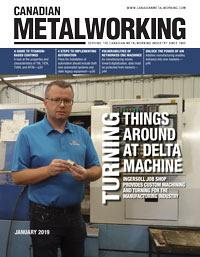CEO
- FMA
- The Fabricator
- FABTECH
- Canadian Metalworking
Vulnerabilities of networked CNC machines
As manufacturing moves toward digitalization, data must be protected from hackers
- By Curt Doherty
- January 30, 2019
- Article
- Metalworking
As manufacturing relies increasingly on the cloud, and more machines communicate with each other both within and outside of the shop, the added efficiency comes with threats of cyberattacks.
Most machining firms and job shops already have migrated toward using monitoring systems, which connect machine tools and other manufacturing equipment to a local, shop-level network that helps managers keep tabs on the production process, including machine uptime, bottleneck identification, and overall efficiency.
What most of them fail to realize, however, is that they’re sitting ducks to an attack having the intention of stealing data or disrupting work flow.
Even though such attacks are rare, and its widely accepted that the benefits of unlocking such machine level data far outweigh the risks involved from cybercrime, it’s only a matter of time before cybercriminals realize the value of such data and its industrywide utility, turning more and more machine shops into targets.
As technology continues to disrupt manufacturing at a dazzling pace, concepts such as the industrial internet of things (IIoT) and Industry 4.0 are no longer just buzzwords. In fact, we already have technologies that allow CNC machines to communicate with their accessories to enable fully automated lights-out manufacturing.
This means that cybersecurity for your shop is no longer something you can keep putting off.
Vulnerabilities and their resolutions
Four key vulnerabilities exist for most shops, but with a little work they can be mitigated.
1. Vulnerable personal computers
Your shop has many PCs and laptops, especially in the engineering, accounting, and management offices. Along with computers that are part of the machining process and network, any PC that isn’t subject to regular security updates is vulnerable to hackers.
The attack may come in the form of a phishing email to unsuspecting employees. Once that email on the network, a hacker can access and modify all data and information that PC has access to.

As the digitalization of industrial machines becomes more commonplace, shop data becomes vulnerable.
To prevent such attacks, ensure all PCs in your network are updated with the latest security measures, and provide training to employees regarding cybersecurity threats.
2. Weak passwords
This should be the bare minimum that you already know, but still it’s surprising to see how many people use simple and predictable passwords that are a walk in the park for anyone looking for a vulnerability. This is especially true given the level of sophistication that most cybercriminals possess.
The problem here isn’t just weak passwords that are susceptible to guessing or cracking, but even those that seem considerably complex with multiple symbols and numbers. Hackers these days have algorithms that can identify probable passwords using just random combinations and other clues.
Such threats are further intensified when the intruder is someone on the inside, who may have a good understanding of your company or access to certain data that can be used to guess passwords accurately.
The only way to guard against this issue is to enforce a standard for passwords throughout your organization. Passwords can be randomly generated with strings of 16-plus characters, and they should be changed periodically across all sites, networks, and devices.
Apart from this, machine shop owners can even consider two-factor authentication, which uses a small USB stick that generates a new key code every 30 seconds and expires after each use. This formula means nobody can access your data by just knowing your password.
3. Physical security
When we get caught up in the high-tech virtual world of cybersecurity, it’s easy to forget about the basics. If a hacker gets inside your facility or is working on-site, all of your security measures are vulnerable, especially if the hacker gets access to your physical network.
It goes without saying that your physical premises, which includes your office, shop, loading bay, and any other infrastructure, must be guarded against intruders. This can be pretty straightforward; a locked door with security alarms and key cards will do the trick.
The purpose of physical security is to ensure no one enters your premises without a valid reason. It’s also necessary to train employees in the importance of following the rules, because no matter what high-end system you put in place, a worker who decides to ignore security protocols could put your entire system in danger.
4. Unscrupulous equipment makers
As hackers get more and more sophisticated, it’s not that hard to sneak in machines and equipment that already have been compromised. Because the shop’s network is not available on the public internet, hackers try to gain access from within. Once a piece of equipment is on the network, a hacker can use it for industrial espionage, ransomware (holding the entire system hostage until a ransom is paid), and stealing manufacturing data.
In such a scenario, the shop network’s firewall is the main line of protection. It provides authentication and other security protocols to authorize access to the network. If you’re providing wireless access to your machine tools, having a firewall is an absolute necessity.
It’s also interesting to note that while new, advanced machines on the floor come with amazing advantages, when it comes to security, nothing beats the older models of CNC machines. On older model’s of data input such as USB drives and SD cards, it’s almost impossible to find a vulnerability, making them very secure.
Curt Doherty is CEO of CNC Machines LLC, www.cncmachines.net.
About the Author
subscribe now


Keep up to date with the latest news, events, and technology for all things metal from our pair of monthly magazines written specifically for Canadian manufacturers!
Start Your Free Subscription- Industry Events
MME Saskatoon
- May 28, 2024
- Saskatoon, SK Canada
CME's Health & Safety Symposium for Manufacturers
- May 29, 2024
- Mississauga, ON Canada
DiPaolo Machine Tools Open House 2024
- June 4 - 5, 2024
- Mississauga, ON Canada
FABTECH Canada
- June 11 - 13, 2024
- Toronto, ON Canada
Zoller Open House & Technology Days 2024
- June 12 - 13, 2024
- Ann Arbor, MI





















